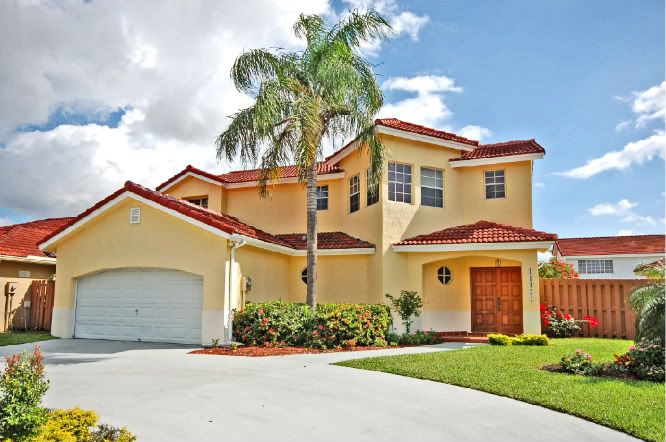Post by The Big PINK One♥ on Nov 4, 2010 20:56:19 GMT -5

This is such a great article. I am in the process of purchasing my first home (kind of backwards) but I wish this was presented to me before I signed my name on the dotted line...
Courtesy of Katherine Lopez via Female Network
Pros and Cons of Living in a House
Are you dreaming about the perfect home? Check out the advantages and disadvantages of living in a house and see if moving into one is for you.
Owning a home is high on the list of everyone's to-do list. Images of a happy couple or a family stepping into their dream house, eyes shining with happiness, are enough to make one look forward to the day he or she will be stepping into one. Picture it: a two-storey house plus a garden with white fence and the occasional barking dog in a breezy community–oh sweet!
But before you head off to the nearest real estate office and discuss monthly amortizations, weigh the pros and cons about home ownership first. Do you really need that two-storey, white-picket-fenced dream? Or would a studio loft be more suited to your lifestyle? Read on and pick up some pointers on the pros and cons about living in a house.
PROS
1. YOU CAN DO WHATEVER YOU WANT IN YOUR OWN HOUSE
Since you own the house--how it looks, the furniture, the layout--all of these depend solely on you. No landlord will stop you from painting your walls magenta or bringing in pets to rival Noah's ark. “With single detached housing, it is easier to personalize one’s space. You have the luxury design the exterior the way you want, choose colors and materials for your façade,” says interior designer and professor Hannah Acab-Faustino, PIID, CIDE. Also, this article from AllBestArticles.com adds, “You can also make some renovations on some parts of the house that you don’t like or you don’t feel comfortable (with).”
2. A HOUSE PROVIDES ROOM FOR A GROWING FAMILY
Sure, a 70-sqm two-bedroom unit may be enough for newlyweds and starting families. But once the children start growing up, there simply won't be enough space for everyone. “If you are planning to have a family, or have kids, owning a house is somewhat more advantageous. With a house, it is easier to plan for future expansion, and not be limited with the confines of your unit in a condominium building,” says interior designer and professor Hannah Acab-Faustino, PIID, CIDE.
3. A HOUSE OFFERS PERMANENCE AND QUALITY INTERACTION WITH YOUR NEIGHBORS
“Buying a home brings a realization that you are part of a more permanent community in which you might be a contributor to the well being of others around you. In a rented home or apartment one might feel less involved and temporary when we humans tend to be territorial, inherently needing to claim a piece of ground as our own with its sense of permanence,” says Dr. Sharon L. Bender in this article.
4. CHILDREN WILL HAVE PLENTY OF SPACE FOR PLAYING
Growing kids need a lot of room to play. “[Condominiums and townhouses] lack the necessary facilities to accommodate a child's needs such as wide open spaces for them to run and play, as well as recreational facilities like parks and playgrounds,” says this article. Also, you wouldn’t want your toddlers running around a small condo unit bumping into furniture and hurting themselves, right?
5. A HOUSE OFFERS MORE PRIVACY
Some houses and lots are located far from business and commercial districts, which makes for a quiet, peaceful living. They also give you more privacy, since a few meters, and not just a wall, separates you from your neighbor, unlike in a condo unit. In townhouses, Hannah adds, “You definitely will have to share the compound with other homeowners as you share the lot.”
CONS
1. A HOUSE REQUIRES A LOT OF MAINTENANCE
Since a house is bigger, maintenance and repairs are more costly, too. Unlike in a rented apartment where the landlord takes care of patching holes and fixing leaks, in a house, you have to deal with it yourself. “Regularly, you should check the condition of electrical and plumbing systems. Due to wear and tear, some cabinets, and even furniture get damaged. Your house should be regularly checked, at the least every 4-6 months,” says Hannah. So that house maintenance wouldn’t be such an overwhelming task, Hannah recommends regular de-cluttering, cleaning, organizing, and having a handyman to routinely check and do repairs.
2. SAFETY AND SECURITY ARE TOP CONCERNS
“Safety and security may also be an issue since you have to be totally responsible (for) caring and watching over the needs and threats of living in a house. Unlike in condominiums or townhouses where security is often provided for, usual housing in the Philippines still reflect a lack in safety and security,” says Hannah. To help you keep your house off the targets of burglars, here are some useful tips.
3. LOCATION, LOCATION, LOCATION
If you're buying a house in an area that is more suburban, it can become disadvantageous. “Though still accessible to key locations of the country, residents may still find it hard to get to work, particularly because of rush hour,” says this article.
4. TRANSFERRING WILL BE MORE DIFFICULT
Say, for instance, you’re assigned to work in your company’s provincial branch, or you’re sent abroad for training. Unless you have family members to live in your house, leaving your nest becomes a problem. You can sell it, which takes a lot of work, not to mention the cost of hiring a real estage agent costs. But if it comes down to that here are things you have to consider when selling your house.
5. YOUR CONDO CAN PROVIDE YOU WITH A SOURCE OF INCOME
“In terms of investing for rental purposes, a condo would be a good and easy choice since it usually is cheaper and easier to lease out,” says Hannah. Because condos are usually located near business and commercial districts, would-be renters will be more likely to choose it over a house that would entail long hours of driving or commuting. Condo units are also easier to maintain than a house, so it’s another minus for the latter.



